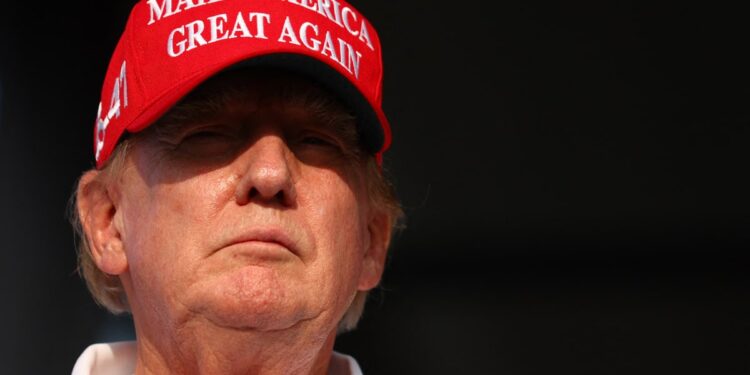A group of anonymous New Yorkers are summoned in a week to a Manhattan court to serve as jurors, a banal civic duty except that this one promises to be historic.
• Read also: United States: Trump says he wants to let American states legislate on abortion
• Read also: Trump more ambiguous on his support for Israel’s offensive in Gaza
• Read also: Fundraising: Donald Trump asks his donors to pay $1M to sit next to him
The case which calls them is in fact unprecedented in History: it is the very first criminal trial of a former American president.
Donald Trump is facing 34 counts of alleged falsification of documents which served, according to the prosecutor, to conceal a payment of money to an X-rated movie star, Stormy Daniels, to buy his silence before the presidential election in 2016.
- Listen to the American political column with Professor Luc Laliberté via QUB :
The Republican, again a candidate for the White House, denies any sexual relationship with Stormy Daniels and denies any fraudulent confidentiality agreement with the actress.
The filing is titled “The People of the State of New York v. Donald J. Trump.” Jury selection is scheduled to begin April 15, and hundreds of Manhattan residents have received summons to appear in court. From them, twelve jurors and up to six alternates will be chosen, with the trial expected to last up to six weeks.
City native
Each potential juror, drawn at random from a public list of residents, will fill out a detailed questionnaire and undergo a selection process called “voir dire”, according to legal terminology having retained these words from old French. Their verdict must be unanimous, hence the importance of each of them.
Prosecutors prosecuting Mr. Trump, like lawyers defending the septuagenarian, will be desperate to know which side the jurors lean politically, knowing that New Yorkers voted overwhelmingly for Democrats Hillary Clinton and Joe Biden, respectively in 2016 and 2020.
On the other hand, although born in New York and having built his real estate empire there, Donald Trump remains a controversial figure to say the least in the megalopolis.
“Manhattan has a long history with Donald Trump,” recalls Leslie Ellis, a lawyer and psychologist expert in juries. “Not just because of his presidency and the time after his presidency, but also because of his experience in real estate and business in New York before that.”
This is particularly why the former president’s lawyers tried, in vain, to delay the trial. According to them, jurors in New York would have been exposed to “enormous biased and unfair media coverage”.
Targeted by several other legal proceedings, Mr. Trump, 77, continues to denounce a “witch hunt” carried out according to him by Democratic prosecutors and judges who seek to derail his campaign to reconquer the White House in November.
“Many potential jurors already believe, wrongly, that President Trump is guilty,” said the candidate’s counsel, in an argument sent to Judge Juan Merchan, who will preside over the hearings.
But District Attorney Alvin Bragg, who filed charges against Mr. Trump, brushes aside that idea. “Given the size of New York County, it is absurd for the defendant to assert that it will be impossible or impractical to find a dozen fair and impartial jurors, plus alternates, from among more than a million people,” Mr. Bragg said.
Protected jurors
In any case, the constitution of the jury promises to be more complicated than usual. Judge Merchan has already ruled that the names of the jury members will be kept secret due to the “likelihood of corruption, jury manipulation, physical harm or harassment.”
The magistrate also warned Donald Trump that, if he violated his order imposing silence outside the proceedings, in particular prohibiting him from criticizing witnesses or court employees, then he could decide not to transmit the names of the jurors to his lawyers.
Such a decision would handicap Mr. Trump’s defense by limiting his ability to seek information about a potential juror, outside of questions asked during voir dire. Just like the prosecutors, the former businessman’s lawyers will have the possibility of preventively challenging this or that juror.
According to Leslie Ellis, although it may seem difficult to believe regarding a figure as high-profile as Donald Trump, there will certainly be potential jurors who will claim, in good faith, that they do not know much about the case.



